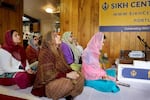To get to the Sikh Center of Oregon, you have to drive down an unpaved road just outside Beaverton before coming upon a single-family home and a large, detached garage, all on what used to be a farm.
From the outside, it looks like any other house. But it’s a sacred space for the local Sikh population. In addition to being a place to pray, Gurpreet Singh, a regular at the gurdwara, said it’s an important gathering place.
“It’s a place for the community to come together,” Singh said. “It’s a place where we share meals together. It’s a place where the kids learn (the Punjabi) language.”

Food is distributed during langar at the Sikh Center of Oregon in Beaverton, Ore., on March 10, 2024. The gurdwara serves two meals every Sunday, which are available to everyone.
Joni Land / OPB
And while many religious congregations across Oregon are losing members, this one is an exception. In fact, it’s growing so fast that its members are looking for a larger building.
Sikhi, often called Sikhism, is a monotheistic religion originating in the 15th century, in the Punjab region of modern-day India and Pakistan. Sikhs call their places of worship gurdwaras.
The only other gurdwara in the Portland metro area is in Vancouver, Washington, meaning for many local Sikhs, this is the most convenient option they have.
Many gurdwaras across the world are massive, ornate buildings that can seat hundreds or even thousands of people at a time. But the Sikhs in Beaverton have had to make do with the small location they have.
The main hall of the gurdwara is in the living room. Congregants sit in contemplative silence next to a kitchen and fireplace, listening to prayers. In a bedroom, dozens of children sit shoulder-to-shoulder to practice hymns and learn the Punjabi language.
Across the small parking lot is the langar hall, constructed in what used to be a garage. Langar is the community kitchen found in every gurdwara, an integral part of Sikh faith. Twice every Sunday, langar is served to those in attendance and everyone else in the community.

Volunteers prepare food and drink for langar at the Sikh Center of Oregon.
Joni Land / OPB
Gagandeep Singh is one of those who attends the gurdwara — many Sikh men take the last name Singh, while women have the name Kaur, to remove class distinction tied to surnames.
He said langar also began as a rejection of India’s previous caste system, which had strict rules about classes eating together. All are welcome, no matter their background or religious affiliation, he said.
“When it started it was for everyone to sit together at the same level and enjoy their lunch or enjoy their food,” he said. “No one’s higher, no one’s lower.”
The space is still small for the needs of the gurdwara. Not everyone can sit on the floor at the same time.

Women pray inside the gurdwara, which is located inside a single-family home.
Joni Land / OPB
The limited space made sense when the group first rented the property more than 10 years ago, back when only several families attended every week. Now, there are more than 50 families, and it’s easy to feel the squeeze on Sundays, according to Sukhjinder Singh Deo.
“Space is a real issue for us, as you can probably see,” he said. “On some of the special holidays, it gets very hard for the people to fit.”
That lack of space is evident all around the gurdwara. Whether it’s in the main temple, in the kitchen or among the dozens of people eating lunch together, one has to constantly negotiate the immediate area.
When the service is ongoing, not everyone can fit inside. Some sit inside the langar, while others stand on the porch outside listening to the hymns.
That’s why the Sikh Center of Oregon has been looking for a new location. It recently purchased a 2-acre property in Beaverton on Southwest Division Street.

People eat food prepared at the langar, which sits inside what used to be a garage and gets very crowded on Sundays.
Joni Land / OPB
Gurpreet Singh said that, once the new building is complete, they hope to have new programs focused specifically on women, children and older people.
“We don’t have enough space for Punjabi school,” Singh said. “There are many projects which we are not doing right now but we can do in the future.”
No matter the size of the current gurdwara, it still plays a vital role for Portland’s Punjabi community. Many in attendance said they enjoy coming to the gurdwara just to speak the native language and share their faith.
Sukhjinder Singh Deo said that’s important for making sure people stay engaged in Sikhism.

Children recited hymns inside the Sikh Center of Oregon. Music is a staple during any Sikh service.
Joni Land / OPB
“Now, there are not many people who look like you, not many people who follow the same faith tradition,” he said. “So you always question yourself, ‘What does it mean to you, to stand out and to practice a different faith?’
“Because it has to have that foundation, that strong root. Otherwise, it’s very easy to just kind of go with the flow and get disconnected over time.”
Before any construction can begin, the Sikh Center of Oregon needs a zoning change for the property approved by the city. The next big step in making that happen is a public hearing for the Beaverton Planning Commission scheduled for May 22.

Rain pours outside the Sikh Center of Oregon. The members of the gurdwara renovated this garage into a kitchen and eating space.
Joni Land / OPB
